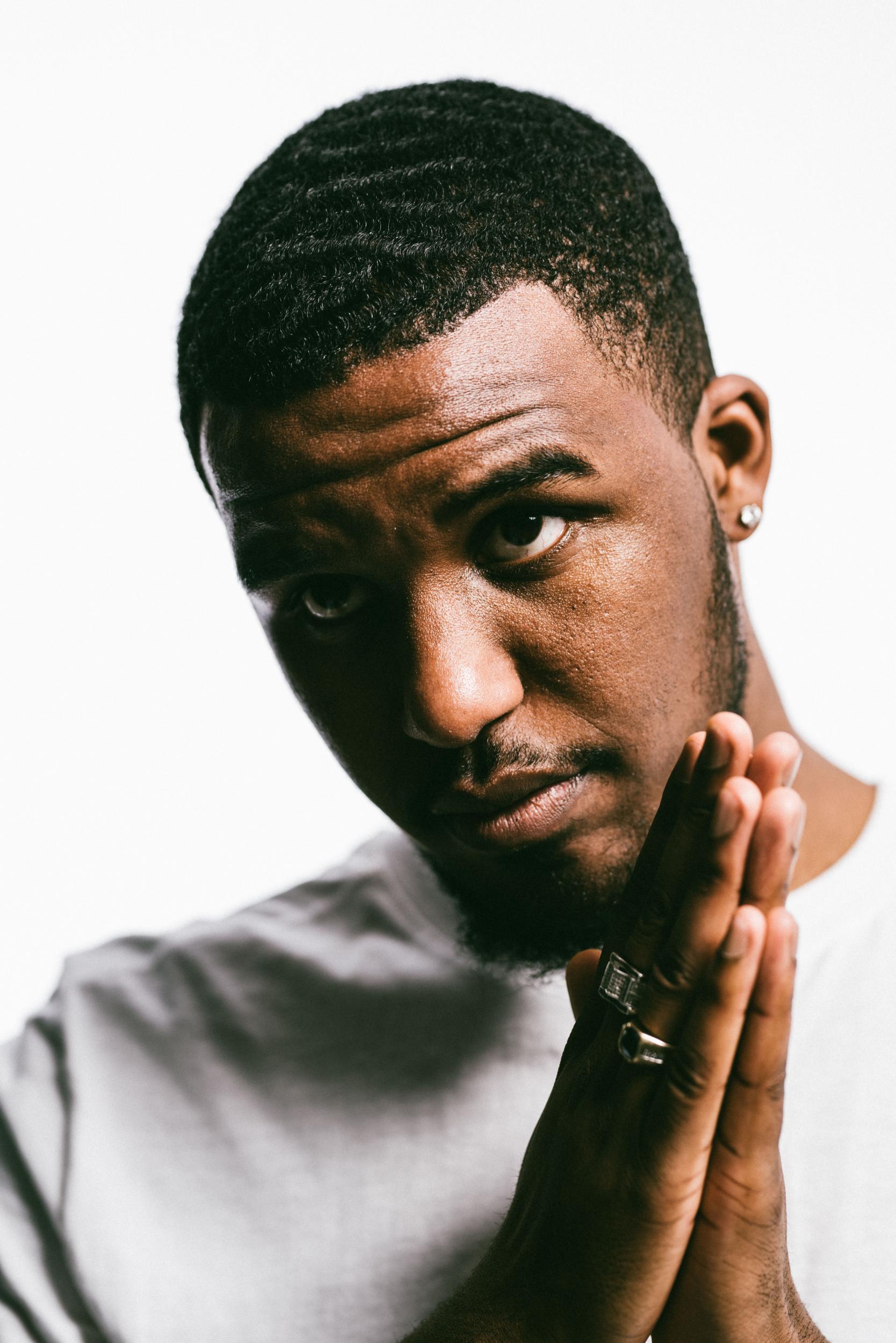The Independent's journalism is supported by our readers. When you purchase through links on our site, we may earn commission.
Novelist interview: 'People don't value life for what it is'
Rising MC and producer on his debut album, violence in the streets, and why he has no regrets about staying independent

You always remember the music your parents played growing up, whether it’s a certain artist or a soundtrack from an old movie. So, on Novelist’s stellar debut album, Novelist Guy, you pick up on influences as wide-ranging as the Pet Shop Boys and Beverly Hills Cop, combined with the most modern production styles and commentary about what’s going on right now, in the UK.
“The old 80s action cop films – I love them,” the 21-year-old south London MC, born Kojo Kankam, explains. “I wanted to emulate the vibe of some of the sounds that I grew up hearing. I repetitively mention Beverly Hills Cop: it’s fun, a little bit cheesy. Very bait noises. But at the same time, it’s a great soundtrack.”
While some of Novelist’s contemporaries have said they received a frosty reaction for attempting to avoid a “grime” label, he says he’s less of a product of grime yet still pays respect to the genre’s old guard.
“I’m not calling all of my music grime,” he says. “Some of it is, but other tracks are just what I feel like creating. The public may call it grime because they might not have an understanding of it, in that way. But I feel that you can’t make something and call it something else.
“It’s who I am as a person, so I wanted to express myself. I’m not a product of grime, I’m a product of how I grew up, and grime was only a part of that.”
He laughs at the double-take he causes when he confirms Novelist Guy was entirely self-produced from his bedroom. “I even mixed it down!” he says, citing a moment as far back as when he began MC-ing as an 8-year-old where he realised he wanted to make the entire project himself.
“Obviously the beats back then were not like they are now. But I’ve always said, even before I stepped into the limelight so to speak, that I wanted to produce my own album. My debut album has to be me, and only me.”
Novelist Guy works because he finds a balance between very explicit, straightforward messages with more obscure, playful lyrics. He recalls when metaphor rap became bigger in the UK, which “did his head in”.
“I try to keep it as simple as possible, but sometimes I’ll do a play on words,” he says.
This is no clearer than on the track “Stop Killing The Mandem”, which sees Novelist deliver the request – or command – with a sharp, stern tone that despairs at the violence taking place, not just in the UK, but around the world.
It’s powerful because he’s speaking simultaneously to the police, the media, and young black men. “Breaking the law ain’t cultural – breaking the law is social,” he spits, criticising those who try to paint gang violence as a cultural issue, which follows his question: “Yo, give me an answer/why would you kill someone you don’t know?” All of this is underlined by the beats, which recall an old arcade game, like a non-verbal critique of how desensitised youth have become to violence – like it’s not real.
“I’ll give you the back-story on the movement on Stop Killing The Mandem,” he says. “There was a Black Lives Matter march in 2016, I believe, and I just saw it online. So I got down there and did what I could. I was at the Rinse FM offices at the time, and I spray-painted on some paper ‘Stop Killing The Mandem’. It’s as simple as that. And I don’t just direct that message to police – it’s to everyone.
“People don’t value life for what it is,” he continues. ”They forget all of those years that a mother or father has put into that person. Whether they’re young or not, well, it’s even worse if they’re older. You have to value people’s lives. That’s what the song is about.”
However, contrary to the opinion of many in his field, he does think there is some kind of link to drill music’s perpetuation of violence.
“Drill music is murder music. That’s what it is,” he says with a shrug. “Do you know what a drill is? It means to put a hole through something. When you do a drill, it means when mandem link up and ride it out. That’s what a drill is about. And that’s a lifestyle.
“If you’re from the hood, then you’ve probably been involved in or experienced this at some point in your life. It’s something that I can definitely relate to, and understand, but I don’t wanna feed my mind with that stuff no more.
“A lot of drill artists are not really musicians. They’re from the ends, and they’re talking realness – their reality on tunes. I can’t condemn anybody for that. I definitely can say, think about what you’re doing; you don’t want your little sister or brother to get caught in a drive-by or a stabbing. All these little guys that are out stabbing each other, they’re the shook ones – because the real Gs survive.”
He feels numb a lot of the time himself, he admits, because of the number of his friends who have been attacked or killed. Each summer, he dreads the arrival of a text to tell him another friend has died. He’s been stabbed himself, he reveals, when he was 13.
“I know about this lifetime crime man, it’s real,” he says. “But I feel that the drill music enforces that way of thinking on to young people. Youths are vulnerable. There are times that guys have tried me, and I’ve actually had to use my mind power to not retaliate. But that’s a choice. Everyone has that choice. Choose.”
Novelist prefers to channel his energy into something altogether more constructive. He’s confident – but not arrogant – about his capacity for success (“I’m going to be rich, I know that. But I’m not chasing”).
One of the reasons Novelist Guy is so rich in influences and themes, he agrees, is because he’s remained independent. There’s no one breathing down his neck, telling him he needs to do something a certain way.
“It’s so funny, isn’t it? A piece of your soul is trapped, basically,” he says of major labels. “I don’t know why people keep signing for them. This story has been on loop for years. I don’t want anything to do with those guys. You know why? The core reason isn’t even the money or being trapped. It’s the fact that they’re not even nice people.
“Why would I want some nasty guy at the top of the pyramid telling me what to do? I don’t even want that negative energy near me, man,” he adds with a laugh.
With his live shows, you never know what you’re going to get – but you can guarantee it’ll be rowdy. Much of the time Novelist goes solo, “but sometimes I bring my mandem as well. Sometimes I freestyle the whole show... and when I say freestyle, I don’t mean with lyrics, I mean with the order of the show. Sometimes I don’t even do PAs, it’s just instrumental.
“You never know what’s gonna happen. The crowd is just pure vibes. We’re not here to get the money and leave. I’m independent, what’s the point? It’s weird, man.”

It’s predictable, albeit slightly depressing, that the only comparison much of the mainstream media has been able to find for Novelist is Stormzy – seemingly because he’s one of the few artists they know enough about. Really, Novelist’s flow and wordplay is more akin to his mentor Skepta, but he’s also pleased to hear it’s actually quite difficult to place him alongside any one artist.
“Someone was asking me where I’d place my record among everyone else’s, and I said the thing is, in an art gallery you don’t have art work that says ‘this is number one, this is number two’, you just have different exhibitions. I feel that my music is in its own room. If you enjoy it, you enjoy it. I’m not saying I’m better than anyone else, or less than anyone else. This is just Novelist. And if you take it, you take it.”
Fans might have wondered why, if he was MC-ing as an 8-year-old, then more professionally aged 13, why it’s taken until the age of 21 to drop his first album. But he didn’t have the life experience he felt he needed, he says, and now he’s gone through enough to say something: “I’m tired of seeing certain stuff happen.”
At this point in the interview, his mum/manager arrives – a force of nature who is clearly as proud as a person can be of what her son has achieved.
“This boy has been like this since he was little,” she says. “He was always ahead, even going to school. He’d get dressed, do his jumper up, put whatever change he had in his pocket, and we left home and he was always walking ahead. It was like I was raising a little man. On one hand that’s awesome, but on another, as a mother, you want him to enjoy being a child.
“As a parent, you’re just trying to meet your child’s needs. Most mothers are out doing the same thing for their kids in one way or another. That’s really just what I’m doing. I love the album. It really has a message for everyone, if you listen to it properly. It’s very mature, but the sooner people grasp certain ways of thinking, the sooner they’ll take charge of their life.”
Novelist Guy, the debut album from Novelist, is out now via Mmmyeh Records
Join our commenting forum
Join thought-provoking conversations, follow other Independent readers and see their replies
Comments
Bookmark popover
Removed from bookmarks